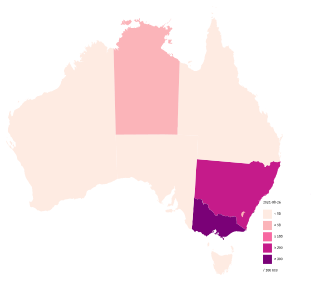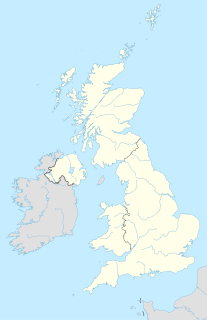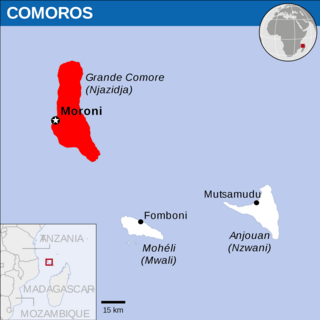Response by the Government of Jersey
Overview of response
On 12 March, the advice from Senator John Fondré, Chief Minister of Jersey was to maintain a semblance of normal life, including continuing to go on holidays off-island, [24] but by 14 March his advice changed, requesting over-65s to start social distancing, [25] and on 20 March he extended this advice to islanders of all ages. [26] Islanders must avoid non-essential travel. [27] [28]
On 19 February a helpline was set up to answer islanders' questions about Coronavirus. [29] It is manned by staff from Customer & Local Services, Health and Community Services and Environmental Health. It handles on average 550 calls per day. [30]
From 20 March all travellers arriving on the island, other than essential workers, must self-isolate for 14 days. [28] From midnight on 26 March those aged over 65 and people with certain underlying medical conditions must self-isolate. [31] On 28 March, islanders were told that if one or more people in a household develop COVID-19 symptoms then all the other members of the household must also self-isolate for 14 days. [32]
On 26 March the Chief Minister called for young people to heed the social distancing advice for the sake of their family members, and bemoaned the spread of unhelpful rumours by conspiracy theorists over social media. [33]
On the evening of 29 March, the Chief Minister announced a lockdown, effective from 8 am the following morning. Islanders must stay at home other than for short periods for specific purposes unless they are employed in an essential function. [34] On 24 April the initial lockdown was extended. until at least 11 May. [35]
The States Assembly passed new legislation, including a law to empower the police to remove people from public areas, enforce self-isolation, testing and screening, and detain those who are potentially infected. [36]
The Chief Minister had said that antibody testing would be key to the ending of the lockdown with 10,000 kits arriving in Jersey in mid April, which were being tested, with a further 150,000 on order from a different supplier. [37]
Informal Governmental discussions on a plan for removing restrictions began in mid-April with the intention to enter formal discussions by the end of the month. [38]
Testing
Initially tests were sent to Colindale in London for processing, [39] with results taking between 48 hours and five days. [40] In March arrangements were being made to establish a test facility on island, and this was expected to be ready as soon as the end of April 2020. [41] Five thousand test kits were ordered. [42]
On 15 March a testing centre was opened at Five Oaks. [43]
On 2 April the government announced that the 5,000 COVID-19 PCR tests that it had ordered were being supplied by Cepheid Inc in California and two other companies. 150,000 serology tests have been ordered from a UK supplier. [39] The serology tests will identify antibodies in people who have developed immunity. They are due to arrive in batches with the first batch expected in April. [39] They intend to test all households in order to enable a phased 'managed exit from the stay home restrictions'. [44] Islanders will be asked to attend mobile testing centres around the island. [39]
As of 1:20pm on 4 April there had been 1,451 tests, of which 126 were confirmed positive and 209 are awaiting results. [45] Three people have died as a result of COVID-19. [46]
On-island testing commenced on 8 April, with the intention that laboratory staff will work 24 hours a day, seven days a week to be able to process same-day results. [47] The Pathology Manager said "Around 20 biomedical scientists and laboratory support staff have been trained to perform [the tests]." [47] Initially the lab was processing 75 tests a day, increasing to 120 a day from 15 April. [4]
Financial support
On 12 March, the Minister for Economic Development announced deferred social security and GST payments, and deferred rent for businesses where the government was the landlord. [48] On 20 March, he announced that government would pay a subsidy of up to £200 a week to workers in the hospitality, retail, wholesale and agriculture and fisheries industries until the end of April. [49] He announced an enhanced package of support on 26 March, using the island's strategic reserve - the so-called 'rainy day fund' - to pay up to 80% of the wages of affected staff in certain industries, capped at £1,600 a month. [50]
Healthcare
Jersey has its own health service, separate to the NHS. [51] Its Health & Community Services department has developed its own response to the virus, having planned for a possible pandemic since at least 2014. [52]
On 19 March, the Minister for Health and Community Services announced that the General Hospital would be closed to visitors. [53]
On 20 March government announced that non-essential operations and outpatient appointments would be cancelled for a four-week period. [54]
On 30 March the Chief Minister stated that ten patients were being cared for at the General Hospital, [55] and that the island has 27 ventilators. The island does not have its own extracorporeal membrane oxygenation (ECMO) machine - patients needing one would normally be transferred to Southampton General Hospital. [56] People who have worked in the health sector such as dentists and pharmacists were asked to volunteer to support the health service. [57]
17 residents at an unnamed care home are being treated for the virus. [58]
Military helicopters based at RNAS Culdrose in Cornwall are on standby to transport critically ill patients from Jersey to intensive care facilities at hospitals in the UK if necessary. They could also be used to fly in medicines, equipment and specialist doctors. [59]
Nightingale hospital
This section needs expansion. You can help by adding to it.(April 2020) |
On 9 April the Government announced that a field hospital would be built on a playing field at Millbrook. [60] The so-called Nightingale hospital will cost £14.4m and will take less than a month to build. [61] It will be 150m long and 30m wide, containing six wards of 30 beds each, [60] but could be expanded to contain up to 240 beds. [61] The field belongs to the family of Lord Trent. [60] The contractor building the site, J3 Limited, is a joint venture between Sir Robert McAlpine, Garenne Construction Group and FES Group. It was involved in building Nightingale hospitals in Glasgow and Manchester. [61]
Criticism
The Government of Jersey has been criticised for inadequate communication [62] and for initially not releasing certain statistics citing data protection reasons. [63] Jersey's introduction of on-island testing was slower than neighbouring Guernsey. [64] In common with most other jurisdictions Jersey suffered from shortages in personal protective equipment (PPE). [65] The media also criticised the lack of a published plan for exiting lockdown. [66]














